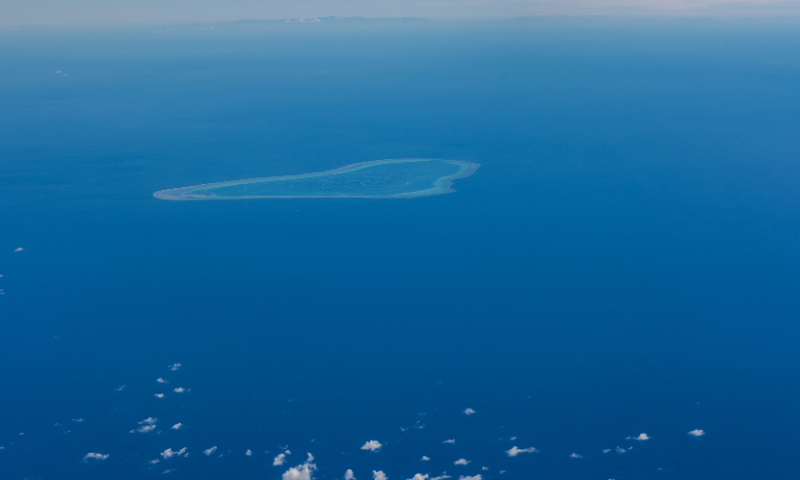
The photo taken on November 22, 2016 shows Huangyan Island in South China Sea. Photo: VCG
The Philippines once again provoked China over disputes in the South China Sea on the last day of the Chinese New Year holidays. While attempting to illegally intrude into waters near China's Huangyan Dao (also known as Huangyan Island) under the pretext of "sending supplies" to fishermen, Manila also groundlessly smeared Beijing for using cyanide to destroy the fishing area.
Chinese experts said Sunday that the Philippines is trying to create more waves among international public opinion to press China through its "combined tactics," but it could not cover up its real purpose of fabricating lies and taking China's islands and reefs as its own.
The Philippine Coast Guard on Saturday accused China Coast Guard (CCG) ships of "dangerous" maneuvers as the CCG has blocked a Philippine Bureau of Fisheries and Aquatic Resources (BFAR) vessel delivering supplies to Filipino fishermen near China's Huangyan Dao, according to an AFP report.
According to AFP, their journalists and reporters from other media were on board the Philippines' BRP
Datu Tamblot for the three-day round trip.
Also on Saturday, BFAR said that Chinese fisherfolk have been using "the deadly chemical compound cyanide" to prevent Filipino fishing boats from fishing in the area by damaging the waters near Huangyan Dao.
Chen Xiangmiao, director of the World Navy Research Center at the National Institute for South China Sea Studies, told the Global Times that the latest move suggests that the Philippines is trying more "combined tactics" to provoke and resist China's law enforcement in Chinese territorial waters.
"This is not the first time that the Philippines has brought journalists from Western media to intrude into China's territorial waters, with the purpose of creating a greater impact in international public opinion and put more pressure on China," Chen said. "These media reports were basically in accordance with the Philippine official preference or guidance, which distorted China's legitimate and proper actions."
In the narrative of an AFP report, Beijing's professional operation to safeguard its sovereignty becomes "harassment" to "prevent Filipino fishermen from reaching a lagoon where fish are more plentiful."
The Philippines was suggesting that China is interfering with the livelihoods of its fishermen, but the fact is that there were no meteorological disasters and the fishermen were not facing humanitarian problems, and there are almost no other countries where fishermen rely on the government for supplies, Chen said.
The Philippines's real purpose is to break into the lagoon of Huangyan Dao, and further take actual control of the Chinese island, he said.
Once the Philippine vessel enters the lagoon of Huangyan Dao, it will further escalate tensions, which could lead to a repeat of the incident in 2012, Chen said, noting that the CCG's operation is a control and preventive measure to avoid escalating the situation.
The fabricated use of cyanide is another untenable lie, analysts said.
Cyanide is a very toxic chemical, and once used, Chinese fishermen will also have no fish to catch, said Chen, noting that Manila's real purpose of making such a lie is to lay the groundwork for a possible environmental lawsuit in the South China Sea filed by the Philippines in the future, which is also part of the combined tactics.
Chinese Foreign Minister Wang Yi on Saturday stated China's stance on South China Sea disputes during his speech at the Munich Security Conference 2024. He said the South China Sea islands have always been China's territory, but in the 1960s and 1970s, some neighboring countries occupied some islands and reefs of China's Nansha Islands, resulting in the existing disputes.
"China has exercised restraint and proposed that issues should be resolved through dialogue and negotiation, rather than the willful use of force like some major powers," said the top Chinese diplomat.
The channels for dialogue and consultation between China and the Philippines are unimpeded, said Chen, "as long as there is sufficient sincerity and willingness, especially for the Manila side, it is realistic and has a solid foundation for the two sides to manage differences through dialogue."
Meanwhile, the expert noted that the Philippine coast guard has close and deep ties with US forces, which means a possible disagreement between Manila's foreign affairs authorities and their coast guard.
Although channels to manage differences remain open, whether these are effective largely depends on policy coordination between domestic departments in the Philippines. But now it seems that the Marcos government has less control over the various branches of government than under the Duterte government, Chen said.




